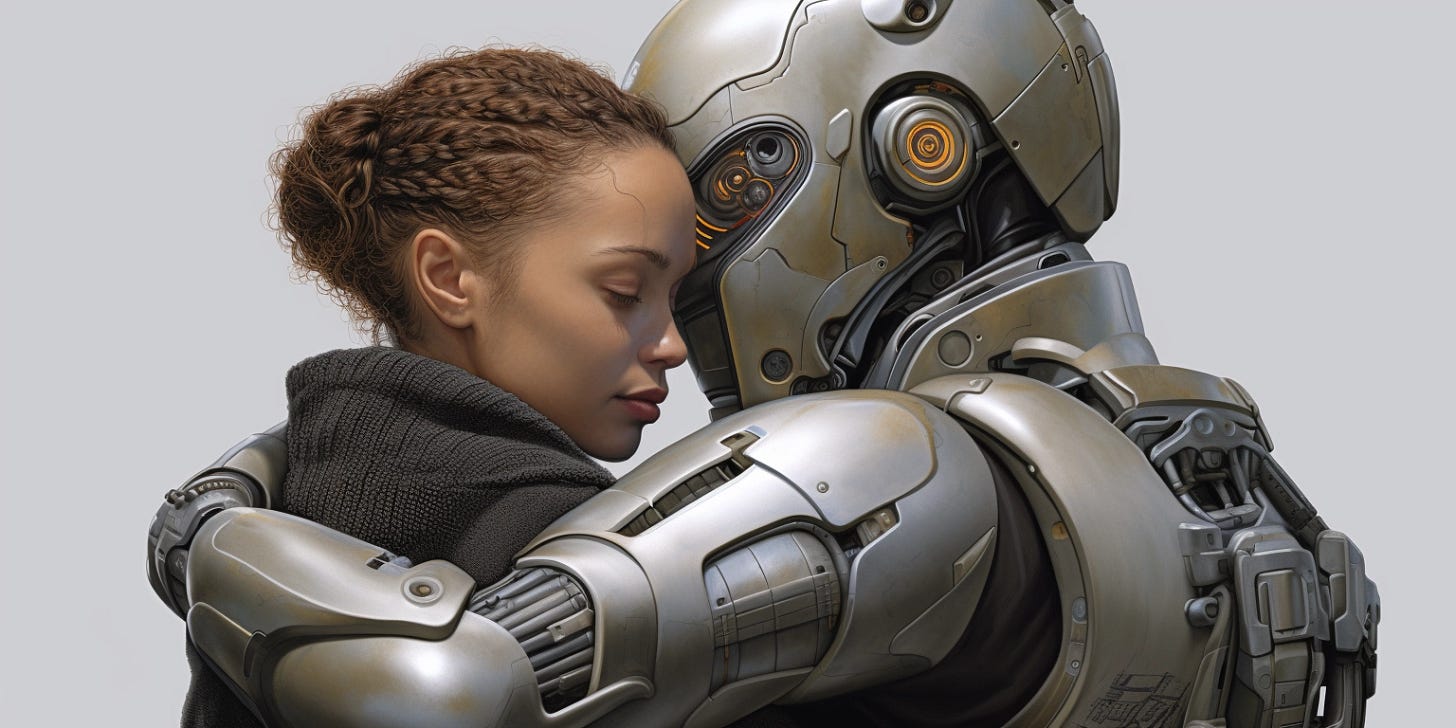As we hurdle and tumble our way towards a – hopefully– better future, humanity will be redefining many of its different paradigms. One of them that I sometimes think doesn’t get enough attention is human connection and intimacy. Ok, I get it we will see humanity’s economic and scientific endeavors radically be revolutionized by the entrance of an Alien intelligence that will exponentially improve upon itself and represent an existential risk – maybe– to our species.
But what about the effects these technologies will have on how we relate to one another, how we enjoy human companionship, and how we mate and take pleasure and fun in our lives alongside one – or multiple– partners in this journey we call life?
We can see the beginnings of this experiment with digital companions and AI partners but how will we use these tools? Will they teach us how to be better partners/lovers and humans in society or will we use them as skinner boxes with extra steps providing immediate pleasure, and reassurance and pigeonhole ourselves in bubbles of gratification and validation?
AI Partners – Beyond Science Fiction
If you've read some of my previous work you'll know I've been following closely the history of the company Replika an AI chatbot that started as a way to create digital “clones” of themselves —hence the name— but then the product evolved and it became the most prominent example of AI partners with their chatbots having a premium function where paying users could sext with their chatbots and the restrictions for that sort of conversations where not active. This led to a lot of its user base developing deep intricate relationships with their Chatbots and some of them even referring to these as their primary partners. Since humans are able to attach feelings and emotions practically to anything – even more when that something is programmed to talk back in an agreeable manner– it can lead to meaningful relationships for those in it.
But when the company decided to do an update and scrape off that feature the community went haywire and the repercussions were such that they needed to add a suicide prevention hotline link to their user interface after this update.
So of course for these people those relationships were meaningful and that's ok I ain't one to judge what other people do with their lives and isn't hurting anyone or themselves by it. But it is a fascinating phenomenon that we have seen not only now but with previous examples of men marrying a Nintendo DS character, or a voice synthesizer software’s hologram that has a cute anime girl as its avatar (both of these cases come from Japan and you'll see shortly as to why this trend)
Japan's Service-Based Intimacy: A prelude of things to come?
In Japanese culture, the commodification (god I love that word) of human relationships can be observed through several unique societal norms and practices. First, we got the concept of amae, which refers to the expectation of and reliance on the benevolence of others, this illustrates a deep-seated interdependence within Japanese relationships, fostering a sense of obligation and indebtedness that is intricately woven into the social fabric. This interdependence is further articulated through practices of hedataru and najimu, which govern the dynamics of personal space and the gradual process of deepening bonds, often marked by rituals like gift-giving or inviting someone into one's home, signifying a progression from formality to intimacy. These might seem like somewhat normal concepts to your culture and model of relationship and intimacy building through dates and activities and sometimes gifts you build intimacy with someone you connect with. But, a key component of this is also the principle of giri, rooted in centuries of tradition, it encapsulates the moral and social obligations to reciprocate kindness and maintain harmony within the society. This feeling of duty underpins the relational exchanges and has historically structured the social hierarchy, influencing both personal and business relationships in Japanese culture.
These cultural constructs–and if we go deeper there might be some influence of Shintoism as well– provide a glimpse into how human connections in Japan have some elements of commodification, where interactions, even intimate ones, are often framed by an implicit transactional nature. This is why we can see the “Love Industry” as a growing and culturally accepted thing there, where almost every single part of the human intimate experience, has become a product or a service. Japanese “Host bars” provide the initial flirting and getting to know one another. Then you can also go to cuddle hotels where the soft delicate intimacy but without sexual connotation can be bought as a service from someone who will cuddle with you and share this intimate non-sexual moment. And of course, prostitution which offers the sexual gratification of a nice encounter with someone else and after repeated times could be a replacement for consistent sex with a partner. (check out the video below for more info on all of that it is fascinating)
As AI and digital mediums advance, these principles could translate into how future relationships with AI partners develop, highlighting a potential path where human-like interactions may be commodified and serve as a nuanced blend of tradition and technology. But will AI partners be a subscription service?
The VR and Adult Toy Renaissance
Now, adult entertainment and technology have an intricate and close relationship that we must not forget. Humans are horny creatures and even though some dominant cultures in some Western countries try to make us forget about it or censor it through their community guidelines we must not forget nor deny the importance in human history.
From the adoption of the VHS over Betamax, or the dawn of online payments, sex is a key driver for innovation and technological standards. So of course in the age of VR and AR, this will NOT be the exception. If you can have already AI partners who you can chat with and share intimate moments with and could probably in some years be “better” at convincing you they love you than other humans – which could be dangerous– why not also share intimate moments in the physical world as well?
This is why VR has not so shyly explored sex and intimate interactions with some prototypes connecting a VR headset with haptic feedback tools to provide a more in-depth experience (mainly used for games) but of course, this technology is being tested as well for more “adult-oriented” games as well implementing sexual toys that can react and interact with what is happening in the VR display. This could lead to a full integration of an AI partner that is constantly texting and chatting with you agreeing to everything you say and feel but that also is a literal machine in sex. Which on a surface level makes it a very skewed playing field if we think about how humans compare to AI partners in these circumstances.
So we shall see if the future will have a whole new wave of innovations in the sex market that will enhance and uplift us to new levels of intimacy and pleasure with both humans and AI partners or if will we become a society of socially stunned humans with our AI partners constantly coddling us and never engaging in real human connections because our AI chatbots are more interesting and “easier” to deal with than a human counterpart and our sexual needs are satisfied by these AI chatbots plus a couple of accessories we keep at home?
Personal Experiences Reimagined
I believe we as humans have not explored ENOUGH with regards to relationship structures and models, like ok, we have hetero and non-hetero couples, monogamy, polygamy, open relationships polyamory, and whatnot. That’s great but these are all taking into consideration humans as the only players in this game. So what happens when we introduce non-human intelligence into the mix?
Will these AI partners be a way of “cheating”? For some, it might for others it could be seen as a harmless experiment, but no doubt for some these AI partners could become a fundamental part of their emotional and support network. It could be interesting to ponder and question how would we perceive these relationships. What would I think if I had a relationship with an AI partner but I know they are also in a relationship with all the other users of the same program this version might be customized and adapted for me but maybe there will be “models” where it’s more of a baseline personality at the beginning and slowly learns to become “your” partner.
The possibilities and pathways are many and hopefully, we take into consideration that there will be people on the other side of the screens, and most of the time very lonely people could be the most fervent users of these platforms and probably some of the most delicate topics about any modification being done to these models could have severe emotional consequences for its users.
Ethical Considerations in a Digital Age
We have previously discussed how can interactions with AI shift our moral compass so we have to address the ethical implications that AI will be having in our intimate relationships. We might be seeing as previously stated the rise of a whole generation of incels (involuntary celibates) who by the comfort and less effort required, will choose to only relate with AI partners and satisfy their social needs through those channels instead of “going outside” and interacting with other humans.
And I understand a little bit the allure of this I think we all due to some level, human relationships are hard, messy, and complicated and they sometimes –most of the times– hurt when things don’t work the way we want them to, so, of course, the allure of an uncomplicated chatbot who is caring and remembers everything we ever said in conversations and is programmed to agree with us, comfort and please we in our emotional needs is a powerful argument.
But I think there is also some responsibility for the developers of these and future AI partner platforms these could be very interesting avenues for developing not replacements for human bonds but sort of “training wheels” ways that people can practice and learn social and communication skills as well as maybe integrated some therapy into it as well. And instead of becoming THE main emotional partner of someone it could become a mentor or a guide on how to develop and thrive emotional connections be them friendship partners and any other configurations you might enjoy.
Navigating Uncharted Waters
If we are already struggling as a society today with these issues of intimate connection I cannot fathom the crisis that we will be having in the near future. But not all is lost because these same tools that represent a threat to us could be the great uplifters of our current failures towards more satisfying relationships with ourselves and those around us.
Also from the data and the cases showcased in the press and media, I noticed an asymmetrical gender distribution of these issues where lonely men are the key component and the strongest market for these AI chatbots and the loneliness industry. Maybe it can be a more structural thing ignoring the loneliness of women or maybe men just got it worse I don't have enough information to give a conclusive statement here.
Then will our future AI partners be tied to the whims of a company? Do we really want to outsource that part of ourselves and risk that in a new update entities with which we developed deep connections could change radically because “the algorithm” now works differently in our platforms? I think these are key questions to be having and asking ourselves because we see so much technology and progress happening in so many areas of the human experience but we are still struggling so much to learn and educate ourselves to create sustainable emotional intimate bonds with our partners, our communities and our support network so these tools could be a great way to enhance and democratize these teachings and help us live more satisfying and fulfilling intimate lives.







